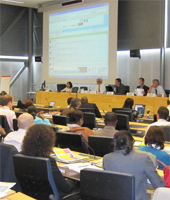
|
| © UNESCO |
11 May 2010 (09:00-11:00); ITU, Room K, Geneva, Switzerland
>> Summary report from the high level debate on social networking
Internet social networking including blog, wiki, as new tools, media and platforms based on Web2.0 application, has gained ubiquitous popularity throughout the world and has had a wide range of political and social implications for knowledge societies. On 8 April 2009, Facebook celebated having its 200 millionth active user and at the beginning of 2010, this number had increased to 360 million. The biggest social networking website Qzone in China had 376 million registered accounts last year, and at the moment on 5 March of 2010, Qzone declared it had 100 million users online at the same time.
The high level debate brought together stakeholders from all over the world ranging from industry leaders, policy makers, civil society to legal experts and users to provide a panorama of the state of art of social networking applications. They exchanged their visions on the opportunities and threats of these tools for the future. The panel also encouraged brainstorming and debates on burning issues of social networking related to the WSIS Plan Actions, which included:
Potential to reinvent political and civic participation
Opportunity and challenge to freedom of expression and privacy
Impact on media and citizen journalism
Implications to empower youth for development
The whole discussion ultimately informed the ongoing WSIS implementation process of WSIS contributing towards building inclusive knowledge societies and put the potential of ICTs at the service of human and social development.
Moderator:
Mr Jānis Kārkliņš, Ambassador of Latvia to France and Permanent Representative to UNESCO and newly appointed Assistant Director-General for Communication and Information at UNESCO
Speakers:
Mr Thomas Schneider, Coordinator international Information Society International Affairs, Federal Office of Communications OFCOM, Switzerland
Ms Msiska Kenneth, Executive Director, Young Advocates for the Advancement of ICT-related Development (Y.A.A.ICT-D), Malawi
Mr Michaël Vanfleteren, Legal Adviser, European Data Protection Supervisor(EDPS), Belgium
Mr Anand Giridharadas, Columnist, The New York Times / International Herald Tribune, U.S.
Mr Bertrand De La Chapelle, Special Envoy for the Information Society, France
Internet social networking including blog, wiki, as new tools, media and platforms based on Web2.0 application, has gained ubiquitous popularity throughout the world and has had a wide range of political and social implications for knowledge societies. On 8 April 2009, Facebook celebated having its 200 millionth active user and at the beginning of 2010, this number had increased to 360 million. The biggest social networking website Qzone in China had 376 million registered accounts last year, and at the moment on 5 March of 2010, Qzone declared it had 100 million users online at the same time.
The high level debate brought together stakeholders from all over the world ranging from industry leaders, policy makers, civil society to legal experts and users to provide a panorama of the state of art of social networking applications. They exchanged their visions on the opportunities and threats of these tools for the future. The panel also encouraged brainstorming and debates on burning issues of social networking related to the WSIS Plan Actions, which included:
The whole discussion ultimately informed the ongoing WSIS implementation process of WSIS contributing towards building inclusive knowledge societies and put the potential of ICTs at the service of human and social development.
Moderator:
Mr Jānis Kārkliņš, Ambassador of Latvia to France and Permanent Representative to UNESCO and newly appointed Assistant Director-General for Communication and Information at UNESCO
Speakers:
